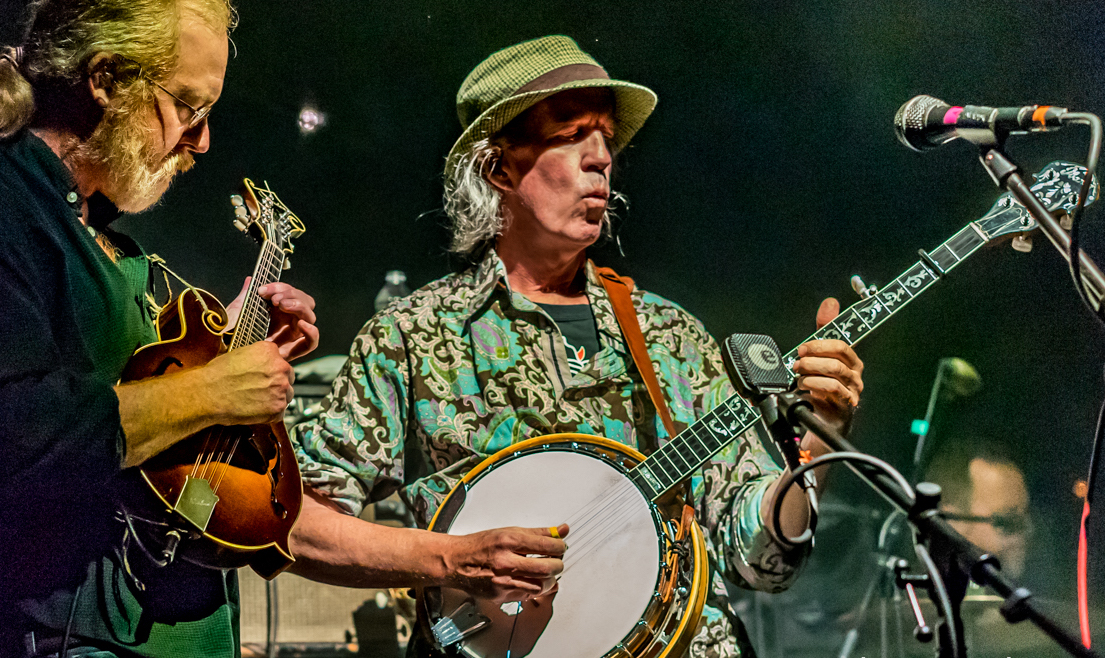In Memoriam: Railroad Earth on Andy Goessling

photos by John Wisdom
The members of Railroad Earth remember their brother and bandmate.
Andy Goessling, multi-instrumentalist and co-founding member of New Jersey–based bluegrass stalwarts Railroad Earth, passed away on Oct. 12 after a battle with cancer. He was 59. A musical jack-of-all-trades and master of many instruments, Goessling was known for playing everything from guitar, banjo and mandolin to saxophone, clarinet, flute and even zither—among others.
At their first show following Goessling’s death, Railroad Earth began their set with the song “Won’t You Come and Sing for Me,” a bittersweet bluegrass tune with lyrics from late singer-songwriter Hazel Dickens, some of which the band shared in their initial confirmation of Goessling’s passing: “How dear to my heart, how precious the moments/ We stood side by side, singing a song.”
Here, the members of Railroad Earth remember their longtime friend with memories, stories and lessons learned from the man they describe as “truly one of a kind—a brilliant musician, and a better person.”
TIM CARBONE: I played the longest with Andy, since he was 18 years old—40 years ago. We were in a band called the Blue Sparks From Hell—a crazy hybrid of old R&B and string-band music smacked together, if you can imagine that. We did a lot of gigs together—250 a year for 15-plus years. I grew with him through several lifetimes of crazy stuff.
Pretty much every instrument he picked up, he killed it on. He was that good, even when he was a kid. When Andy was young, he was one of those kids that would practice for hours because it was what he was interested in. It was more than just a hobby; it was like he was mad about it. He’d be playing guitar, mandolin, zither, clarinet, saxophone—all in his bedroom. Then one month, he got ahold of a violin and kept trying to play that for a couple weeks. All of a sudden, his mom knocked on the door, came in and said, “You know what, Andy? That might be one you can’t play. [Laughs.]
TODD SHEAFFER: I first saw Andy in the Blue Sparks; we used to go down to see them when I was in high school and they’d play at The Stanhope House [in New Jersey]. When I knew that band, it was straight-up R&B and swing. He played saxophone; I thought Andy was just a saxophone player! [Laughs.]
JOHN SKEHAN: I remember seeing the band Kings in Disguise and watching Andy play two horns at once, plus an electric 12-string guitar at one point and electric mandolin as well. I thought he was brilliant. When they took a break, I rushed at him at the bar, started asking him all kinds of questions about his instruments and said, “Can I buy you a beer, man?” And I got one of those long Andy pauses and sideways looks. [Laughs.] I think he just got a seltzer or something, then the band went back on.
But Kings was very much a rock band, and it was a good bit later that we got together for one of the first bluegrass jams at Andy’s house. I hadn’t really been playing mandolin or bluegrass for a while, but I figured it would be easy to relearn. And I just remember hearing him pick up a mandolin and play proper bluegrass for the first time and thinking, “I don’t even understand the depth of what this guy can do.” He just blew my mind.
TIM: Andy was a diamond-encrusted Swiss Army knife. He was always about what the texture of a song could be and he added whatever he thought that should be, whether it was dobro, banjo, mandolin, guitar, penny whistle, saxophone, flute—the list goes on and on. He was a texture guy, for sure, though he could absolutely rip a solo on pretty much any of those instruments. He was always adding something essential to the song. We’d be creating a painting and he’d go, “Well, let’s use this color. I have it in my paint box.”
TODD: His knowledge of instruments was incredible and a big part of his musicianship. My M.O. was basically: Find a guitar I like, plug it in and play it until I beat the shit out of it, then get a new one. [Laughs.] I learned how to take care of an instrument from Andy and how setting it up properly is really important to the musicianship you can bring to it. The guitar I’m playing now is one Andy found for me in a shop out in Idaho. He said, “You should check this one out.” And I was like, “Yeah, alright. I trust you. I’ll get it.” And I’ve been playing it ever since.
ANDREW ALTMAN: I joined the band last, in 2010, so that’s when I met Andy. I grew up in the South, so I hadn’t run across any of the guys. I don’t like the term “musical genius” because [it implies that] someone was given something they didn’t work for. It’s not divine intervention here. People work their asses off.
Andy played all these instruments and he played them all really well. When I joined the band, I was like, “I played trombone for eight years and I played guitar before I ever played bass—I see how someone can do that.” But he was a great soloist on at least three or four instruments, in addition to being able to play the others in certain roles. He had two lifetimes’ worth of ability. I can’t think of anyone else that I’ve met yet that I would describe in that way.
TIM: I wish there was technology around that would let you download whatever was in his brain—it was like a couple different encyclopedias combined. No matter what you were talking about, he’d be able to chime in, in a knowledgeable way. He read a lot; even though he wasn’t a violin player, he read a bunch of books about violins. He could fix furniture—that’s one of the things he did for a living, too. I’d walk into an antique store with him, and he would know what era a table was from or what country its original design came from. Crazy stuff like that—it just goes on and on.

ANDREW: Ironically, as smart and well-read and knowledgeable as he was on so many topics, technology was not one of them, which is funny. When I joined the band, we were definitely firmly in the age of the laptop, the smartphone and all that, but we’d be having a meeting and he’d pull out a paper calendar. [Laughs.] We’d look at him and go, “What the hell is that?” It was so funny. He was like, “I don’t know. I don’t use that.” He couldn’t get his email to work half the time.
JOHN: He had a paper wallet—an envelope that was falling apart that he kept stuffing cash into, and you’d wonder, “How is he not losing this?” Andy also existed in a different currency with his knowledge of instruments. I swear he had a sixth sense for being able to pull into a town and know if there was something around, whether it was at a pawnshop or an instrument store or a junk shop. He was constantly buying stuff on the road, then he’d recycle those things as currency, like a saxophone that needed some repair that he would later sell or trade for yet another instrument.
TODD: We were on the road and Andy had, as usual, just bought an instrument. This time it was a clarinet. He was like, “Well, this is the one that Bix [Beiderbecke] played on this so-and-so recording in 1927.” And I was like, “Oh, OK.” [Laughs.] For him, learning about all those instruments went hand-in-hand with learning a style and an era of music.
CAREY HARMON: Before we got into payroll, it was cash envelopes every week, and he’d keep them all—Andy would do most of his wheeling and dealing on the road in cash. Then, all of a sudden, he had direct deposit, which blew his mind. But he had no bread, so it totally ruined his scene on the road. I said, “Dude, you gotta get a debit card.” And he came to me, in all seriousness, not that many years ago and said, “Now, with this debit card thing, does it have to be from my bank?” [Laughs.] I’m like, “Oh, God, Andy, we gotta talk about this.” It was a serious Luddite streak that he was proud of.
ANDREW: I’ll tell you one thing, though: His grasp of technology grew a leap when he found out about eBay. [Laughs.] All of a sudden, he had an iPhone and he was looking at it all the time. It was like, “You hardly check your email; what are you doing?” We’d be in the middle of soundcheck, you’d look over, and he’s on eBay buying and selling used shit. All of a sudden, he was a master of the iPhone.
CAREY: We were in Arkansas playing a festival, and we’d found out [about his passing] on the morning we were traveling there. And there was just overwhelming feedback from people when they found out the news. Not that it was completely surprising, but to see how many people he had touched in so many different ways—it made the whole thing better somehow. If you can go through your life touching five people the way he did hundreds, then it’s a life well lived. It was a life far too short, but it was remarkable. And in such an unassuming way, which was an important part of his character. His musicianship, his personality—it was never a “look at me” thing. It was much deeper than that. From going to people’s recitals to checking out their bands and sitting in with people to just being onstage with a very subtle smile—everybody noticed, and it moved them.
ANDREW: He had been on and off the road; we knew he was sick. Now in retrospect, we’ve all tried to appreciate what a tough spot he was in because the prognosis wasn’t good from the get-go. He was with us for all of the winter tour last year, doing really well, but then it came crawling back this summer. You’re never ready. Even having a year and a half of knowing what’s going on, you can’t imagine your life without someone you spent almost as much time with as you did your actual family.
TIM: Some of my last conversations with Andy were about how he wanted the band to continue on and grow; he didn’t want what was happening to him to change that. In that spirit, that’s how I’m going on, and I think that’s how we’re going on as well.
ANDREW: What I’ll remember about Andy are the things he was naturally good at that I’m not—not just musical things. He never lost his temper, never got frustrated. It didn’t matter what was going on, he’d just keep going. When you’re traveling, and you haven’t had sleep or a meal or a shower, it’s easy to get frustrated and let your attitude suffer. He rarely, if ever, did that. He was very even, and that’s an inspirational thing. It’s hard to undo our natural tendencies, but I’d like to aspire to be more like that. I want to hold on to that inspiration.
JOHN: As far as I’m concerned, Andy was an absolute singularity. They made that guy then retired the directions.
This article originally appears in the January/February 2019 issue of Relix. For more features, interviews, album reviews and more, subscribe here.



















